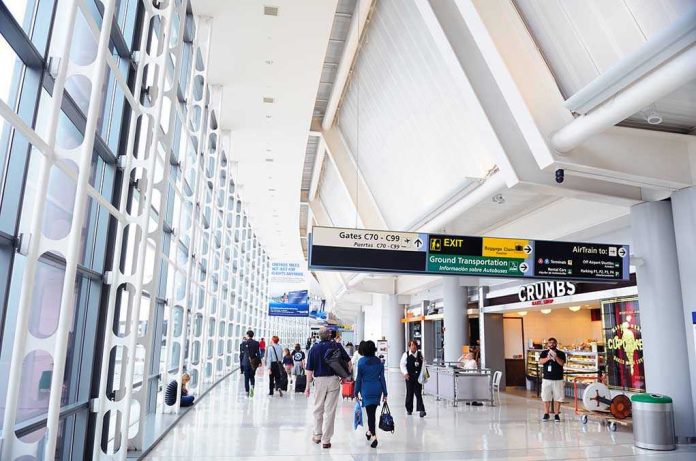
Harrisburg Airport’s public address system became a battleground for world politics when a hacker seized control and unleashed an expletive-laden anti-Trump, anti-Netanyahu message, raising urgent questions about digital security and the reach of modern activism.
Story Snapshot
- A hacker broke into Harrisburg Airport’s PA system, broadcasting profane messages targeting President Trump and Prime Minister Netanyahu.
- The incident spotlights the vulnerability of critical infrastructure to politically motivated cyberattacks.
- The attack’s messaging invoked “Free Palestine,” signaling a global political agenda behind the breach.
- Authorities and airport officials are investigating both the hack and its broader implications for public safety and digital security.
Airport Hacked: A Political Message Delivered by Machine
Travelers at Harrisburg Airport, long accustomed to boarding announcements and weather delays, were jolted by an unexpected broadcast: a stream of profanities directed at President Trump and Israeli Prime Minister Benjamin Netanyahu, punctuated by a rallying cry for “Free Palestine.” The message, lasting just under a minute, cut through the din of luggage wheels and coffee orders, leaving passengers confused, startled, and, in some cases, alarmed. The airport’s security team responded by shutting down the PA system, but not before dozens of travelers had recorded the message on their phones, ensuring the incident would reverberate far beyond the terminal’s walls.
The choice of targets—Trump and Netanyahu—was deliberate, connecting domestic American politics with the international debate over Israel and Palestine. By weaponizing a public address system, the hacker bypassed traditional media filters and forced a captive audience to confront a message that was both abrasive and unmistakably political. This was not the work of a bored teenager or a prankster. It was a carefully chosen tactic, aiming to transform a mundane travel hub into a stage for global agitation.
Digital Vulnerabilities Exposed in Public Infrastructure
The Harrisburg attack underscores a challenge that security experts have warned about for years: the digital vulnerabilities embedded in public infrastructure. Most airport PA systems were designed decades ago with little thought for cybersecurity, operating on outdated protocols and, in many cases, relying on networks that can be accessed remotely with the right technical know-how. Hackers with a political agenda, equipped with off-the-shelf tools and a basic understanding of network architecture, can exploit these weaknesses to deliver their messages directly to the public, bypassing both law enforcement and the media gatekeepers who once controlled the narrative.
Authorities have not released details about how the hacker gained access, but similar incidents in the past have often involved unsecured network ports, easily guessed passwords, or even inside knowledge from former employees. The attack serves as a warning for airports and other transportation hubs across the country: the era of analog security is over, and the stakes are higher than ever when politics and technology collide.
Political Motivation and the ‘Free Palestine’ Slogan
The content of the broadcast left little doubt about the hacker’s motivation. “Free Palestine” has become a rallying cry for activists worldwide, often employed in both peaceful protests and more provocative actions. By pairing this slogan with direct attacks on Trump and Netanyahu, the hacker positioned themselves squarely within a global movement that views both leaders as antagonists in the ongoing Israeli-Palestinian conflict. This was more than vandalism; it was an act of digital protest, designed to provoke, unsettle, and draw attention.
The method, however, raises ethical questions even among those sympathetic to the cause. Using public infrastructure as a platform for political speech crosses into territory where free expression collides with public safety and trust. The airport, a place where travelers expect security and order, was transformed into a venue for ideological confrontation—a development that will not soon be forgotten by those who heard the message firsthand.
Authorities Respond and Broader Implications
In the aftermath, airport officials and local law enforcement launched an investigation, promising to upgrade digital defenses and pursue those responsible. Yet, the incident has already achieved a measure of success for the perpetrator. News of the hack spread rapidly across social media, with video clips racking up thousands of views and reigniting debates about airport security, the limits of protest, and the ever-blurring lines between the physical and digital realms.
For Americans, especially those wary of expanding digital threats and politicized institutions, the Harrisburg hack is a wake-up call. It highlights the need for common sense investments in cybersecurity, the dangers of complacency, and the unpredictable ways in which global conflicts can intrude on everyday life. As digital activists grow bolder, and public infrastructure remains exposed, the question is not if this will happen again—but where, and with what consequences.

